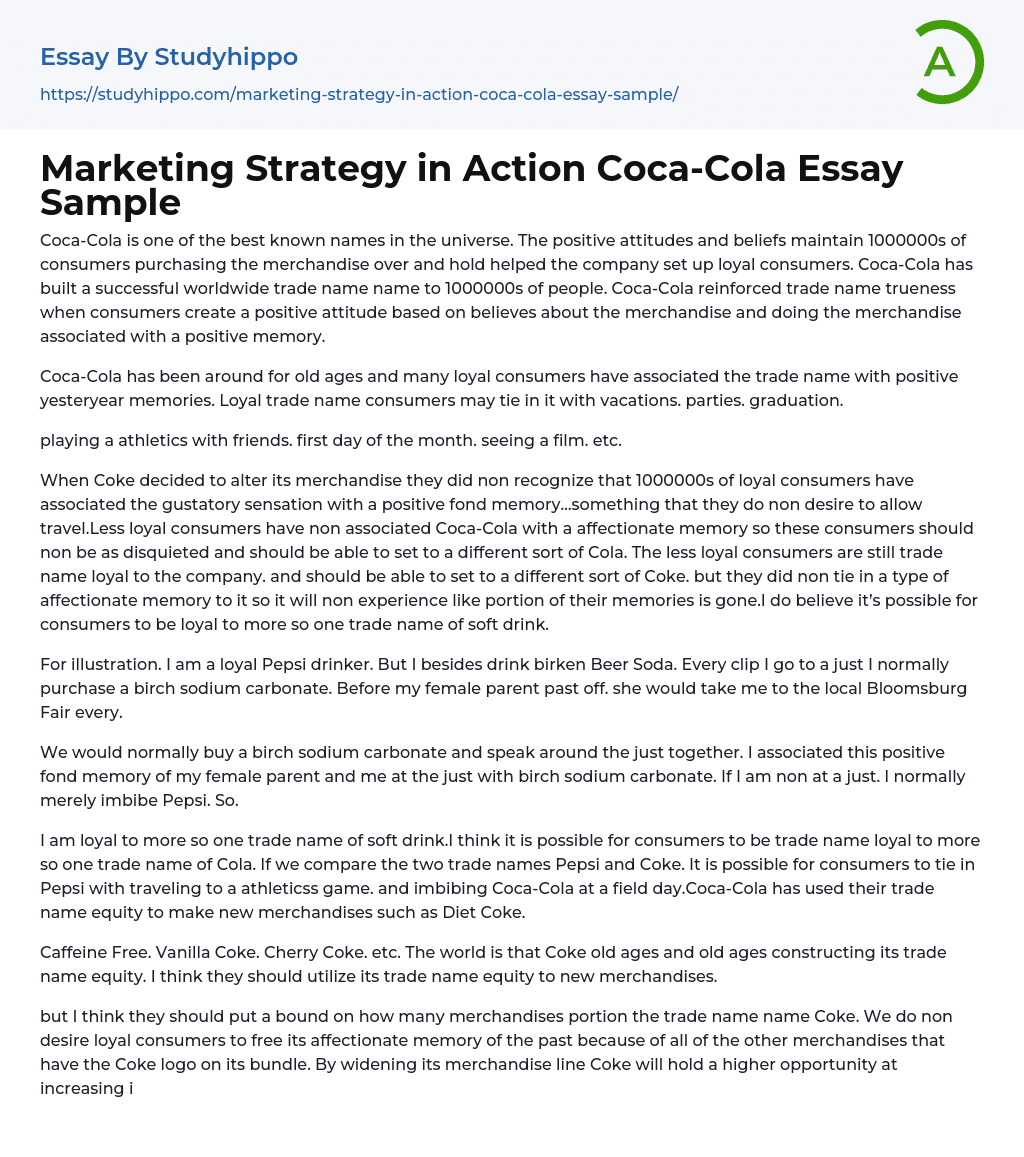Coca-Cola has managed to establish a powerful worldwide brand and dedicated following through the cultivation of favorable attitudes and convictions, leading to countless product sales. The reason for the company's triumph is linked to its aptitude for generating affirmative recollections tied to the merchandise, which serves to strengthen loyalty towards the brand.
What sets the Coca-Cola brand apart is its capacity to trigger sentimental emotions among loyal patrons who frequently recall happy moments from their personal histories, such as holidays, celebrations, and academic achievements.
Friends can engage in different activities on the first day of the month, including sports or movie-watching.
Coke underestimated the attachment millions of loyal customers have to its taste, which is linked to positive memories they don't want to lose. Howev
...er, less loyal customers who do not associate Coca-Cola with an emotional connection should not be as upset and can switch to another cola brand. Despite being less loyal, these customers remain devoted to the Coca-Cola brand and can adjust to a different type of Coke without feeling like they've lost a part of their memories. It is possible for consumers to be devoted to more than one soft drink brand.
For example, although I am a faithful Pepsi consumer, I also indulge in Birch Beer Soda. Whenever I attend a fair, I typically purchase a birch soda. Prior to my mother's passing, she would accompany me to the Bloomsburg Fair.
We usually purchase a birch soda and converse at the fair, which reminds me of a pleasant memory with my mother. If I am not at a fair, I typically only drink Pepsi.
As a consumer, I am dedicated to various soft drink label
and firmly believe that one can remain loyal to multiple Cola brands. When contrasting Pepsi and Coke, individuals might associate Pepsi with athletic events while Coca-Cola is linked to outdoor gatherings such as picnics. Furthermore, Coca-Cola has leveraged their brand esteem to introduce fresh products like Diet Coke.
Having established their brand equity through the likes of Caffeine Free, Vanilla Coke, and Cherry Coke over a number of years, I believe that Coca-Cola should utilize this advantage to launch fresh products.
Coca-Cola would be prudent to establish a restriction on the number of products featuring its brand name. The company must exercise caution in avoiding a reduction in customer loyalty by overusing the Coke logo across multiple products. Nevertheless, broadening its product range could result in increased sales. An excess of Coca-Cola branded merchandise may disturb devoted followers and potentially harm the company's standing. Developing new items with distinctive brand names is an advisable strategy for Coca-Cola.
Coca-Cola must take into account its trade name equity and determine whether it should extend it to another product, in order to avoid impacting loyal customers who associate the brand with a past memory. Moreover, the company should prioritize consumers as they ultimately make the purchasing decision for the beverage.
The decrease in sodium carbonate consumption by consumers has a direct impact on Coca-Cola's syrup sales to its customers. Coca-Cola holds the top position among soft drink companies worldwide and has a strong brand equity, partly due to the loyalty of its consumers who have cherished memories associated with the brand.
During the 1996 Summer Olympics, Coca-Cola sponsored the event, which allowed them to utilize their trade name equity and establish a connection
between themselves and the event. This approach proved to be advantageous due to its cost-effectiveness.
Linking the Coca-Cola brand with the Olympics generates a favorable recollection for customers that can impact their choice to purchase Coca-Cola later on. While the Olympics is an enormous worldwide occasion with countless spectators, there is a drawback to utilizing equity borrowing - some consumers may not associate the Coca-Cola brand with the Olympics, leading to potential resource waste on these individuals.
Creating brand equity helps consumers develop loyalty to a specific brand. If consumers can associate positive memories with the brand name, they will become loyal customers for life. Coca-Cola is also working on developing new labels and packaging for their existing products to create reactive brand equity. However, the downside to reactive brand equity is the risk that loyal customers may no longer associate the product with fond memories due to its altered appearance. On the other hand, creating reactive brand equity may motivate loyal customers who haven't purchased Coke in a while to make a purchase. To build its brand equity, Coca-Cola has introduced a Contour bottle worldwide.
Thanks to the marketing team's success and the Coca-Cola Company's widespread popularity, the Coca-Cola bottle could soon become one of the most universally recognized bottles around.
- Competition essays
- Effective Leadership essays
- Leadership Styles essays
- Public relations essays
- Planning essays
- Mission Statement essays
- Outsourcing essays
- Swot Analysis essays
- Business Analysis essays
- Business Plan essays
- Strategic Management essays
- Strategic Planning essays
- Reasoning essays
- Community Development essays
- Negotiation essays
- Adidas essays
- Amazon essays
- Apple essays
- Bmw essays
- British Airways essays
- Burger King essays
- Coca-Cola essays
- Company essays
- Costco essays
- Dell essays
- Ebay essays
- Enron essays
- Facebook essays
- Ford Motor Company essays
- Gap essays
- General Motors essays
- Google essays
- Honda essays
- Ibm essays
- Ikea essays
- Intel essays
- Iphone essays
- Johnson and Johnson essays
- Kellogg essays
- Key essays
- Kfc essays
- Mcdonald's essays
- Microsoft essays
- Myspace essays
- Nestle essays
- Netflix essays
- Nike essays
- Nokia essays
- Pepsi essays
- Pepsico essays




